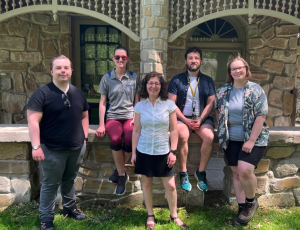Dr. Merri Rosen, Kate Hardy, Matthew Sunthimer (NEOMED)

It’s well-known that hearing problems in kids may cause later trouble with understanding complex sounds, such as speech in a place with a lot of background noise. But our lab is the first to show that early-life stress (ELS) during development can cause similar problems. Many labs have studied the effects of ELS on the development of brain regions responsible for attention, learning, and related psychopathologies. Our work has found that auditory information is not being encoded properly before it even reaches these higher-level brain regions. This is important, because children who grow up in low-socioeconomic, high stress environments are at risk for later problems with speech perception. Discovering what is going wrong mechanistically will help prevent and remediate these problems.

Current Project
We are looking for a student to assist in testing gerbils on behavioral tasks to measure their auditory perception and learning abilities, and quantify animal behavior using video analysis
Students will:
- Receive training in experimental techniques used widely across research fields in biology and neuroscience
- Learn how to apply critical thinking to big problems in neuroscience
- Opportunities to attend weekly journal clubs on Auditory Neuroscience in the Hearing Research Group at NEOMED, and related seminars given by neuroscience faculty from around the world
